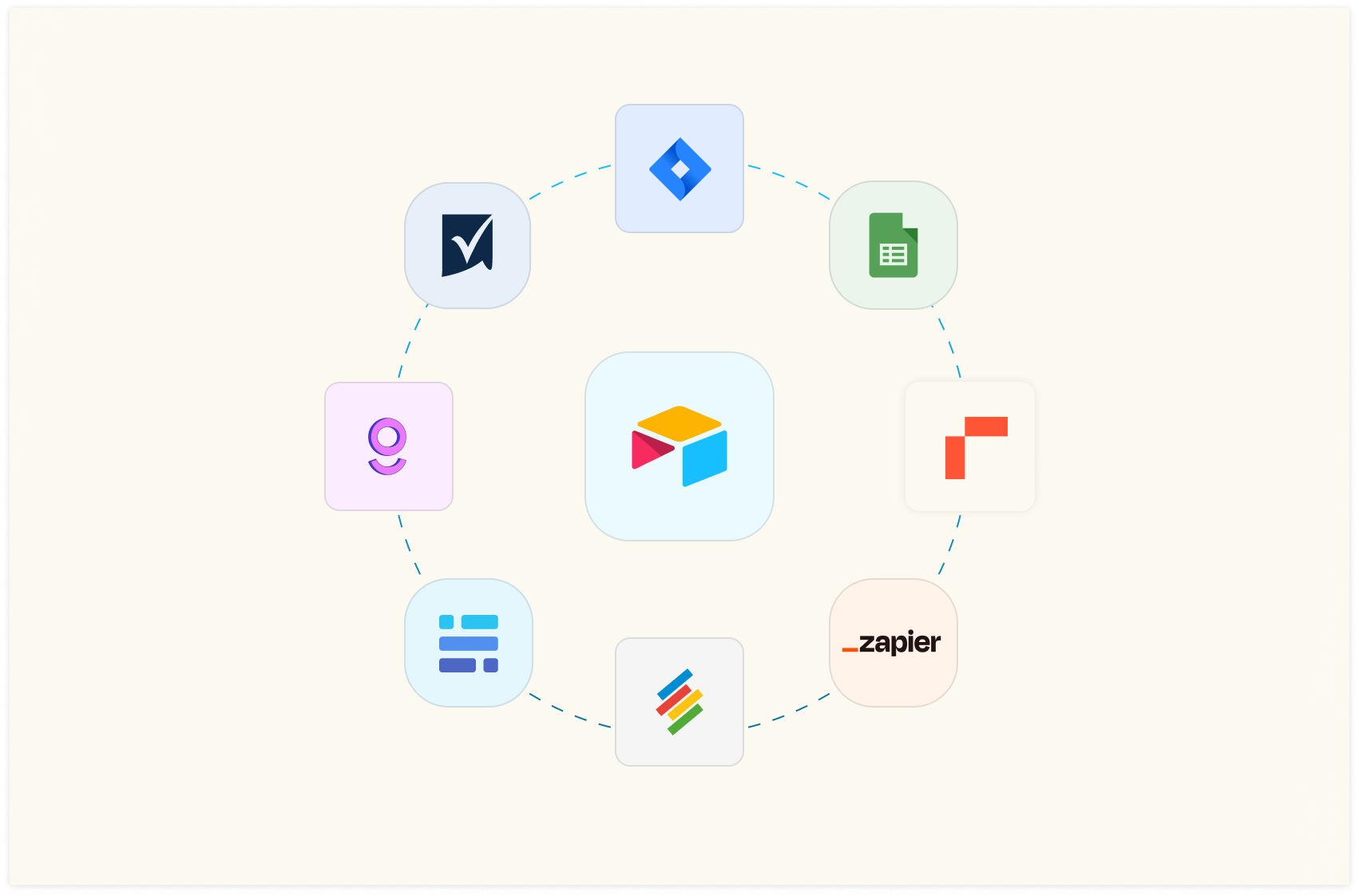How to create a Google Search Console SEO dashboard in Notion

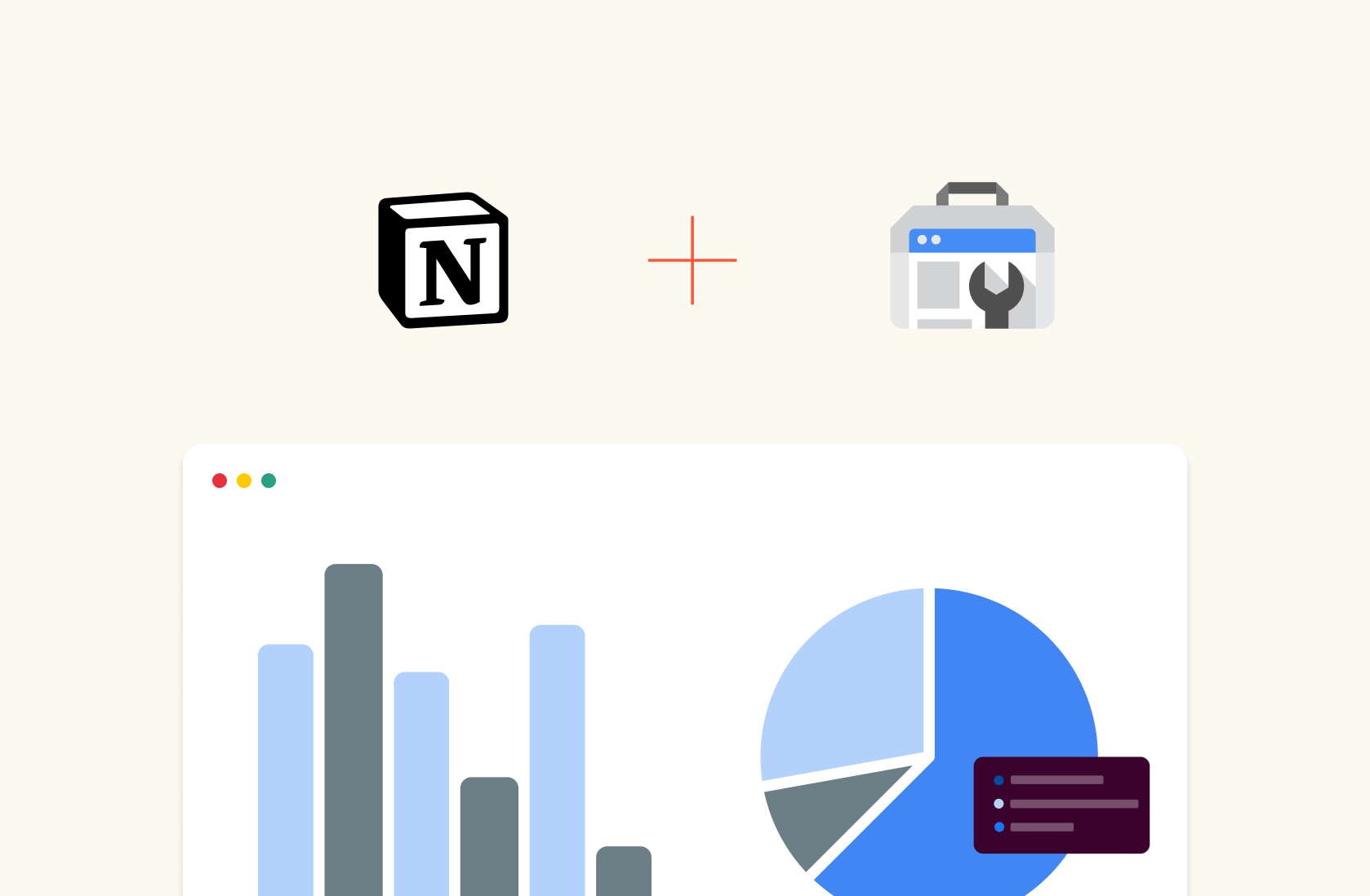
Notion is a multifunctional project management tool, great for teams of any size. It is popular for its versatility in organizing daily tasks effectively. It can be used as a company wiki, CRM for sales, a tool for generating marketing reports, and more.
More and more teams are using Notion to share marketing reports. This article explains how to create Google Search Console dashboards in Notion to convenient track the SEO performance of your websites.
We’ll build the dashboard in two steps:
Create the report in Rows, connected to Google Search Console.
Embed the charts and tables in Notion.
Let’s dive in
Part 1 : Create the Google Search Console report in Rows
1. Go to Rows.com
Rows is a web application for creating modern, beautiful spreadsheets. It combines a modern spreadsheet editor, data integrations (e.g. Social media, Google Analytics 4, Salesforce, Instagram) and a novel sharing experience that turns any spreadsheet into a website in one-click.
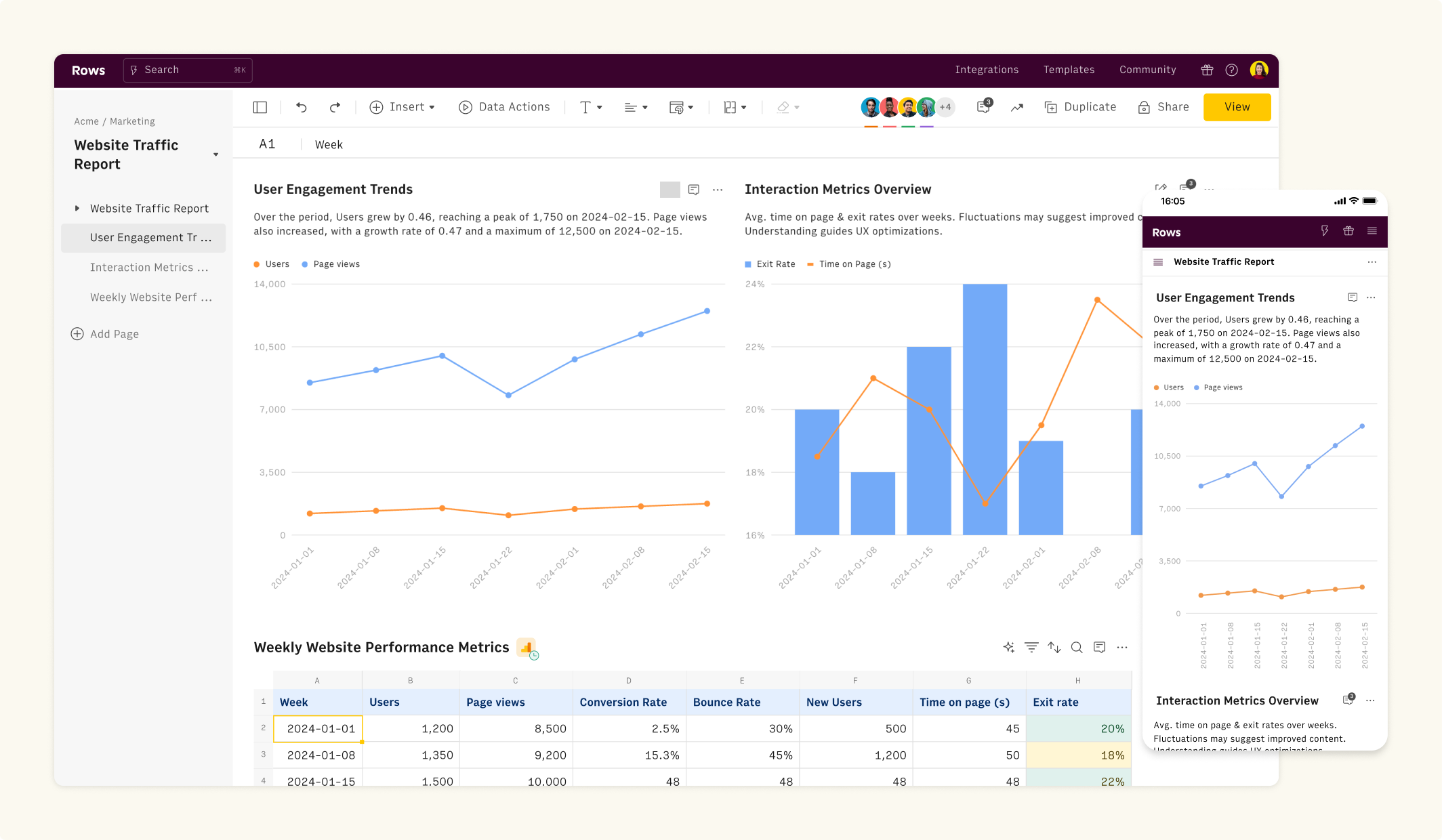 Rows is a modern spreadsheet
Rows is a modern spreadsheetFollow the steps below to create your first spreadsheet:
If you haven't signed up for Rows, do that here and login to your account.
Create a spreadsheet. Do this by clicking on the “Create Spreadsheet” button.
2. Connect the Google Search Console integration
Now it’s time to connect Google Search Console to Rows to import your data to the spreadsheet.
To do this:
Click on the Data Actions option located in the top format bar of the spreadsheet.
On the search panel, look for Google Search Console
Select the Get the performance of your site from Google Search Console action
Click Connect to finalize the integration. You’ll be directed to a new browser tab to complete the authentication with your Google Search Console data.
You can find the Google Search Console integration in the Data Actions panel.
 Google Search Console actions in Data Actions panel
Google Search Console actions in Data Actions panelIf you don’t have a Google Search Console property install, follow the official Google Guide to add it to your website.
3. Create your report
Once the integration is connected, you can easily build your report in Rows. There are two ways of doing it:
 Google Search Console Pre-set reports
Google Search Console Pre-set reportsRecommended Reports: Rows offers a set of +10 recommended reports that automatically import SEO reports with pre-set metrics to your spreadsheet that mimic the standard reports you see in the Search Console dashboard.
These include:
Query Performance in the last 90 days
Pages Performance in the last 90 days
Query-Page Performance in the last 90 days
Blogposts Performance in the last 90 days
You can customize the report by going to the Edit Data Table icon on the top right corner of the table. Here you can:
Add/Remove metrics from the report by going to the Edit Action panel.
Schedule an automatic data refresh for the report.
With a scheduled refresh the report will update automatically every day (or hour, or minute, or at specific times) without any manual work.
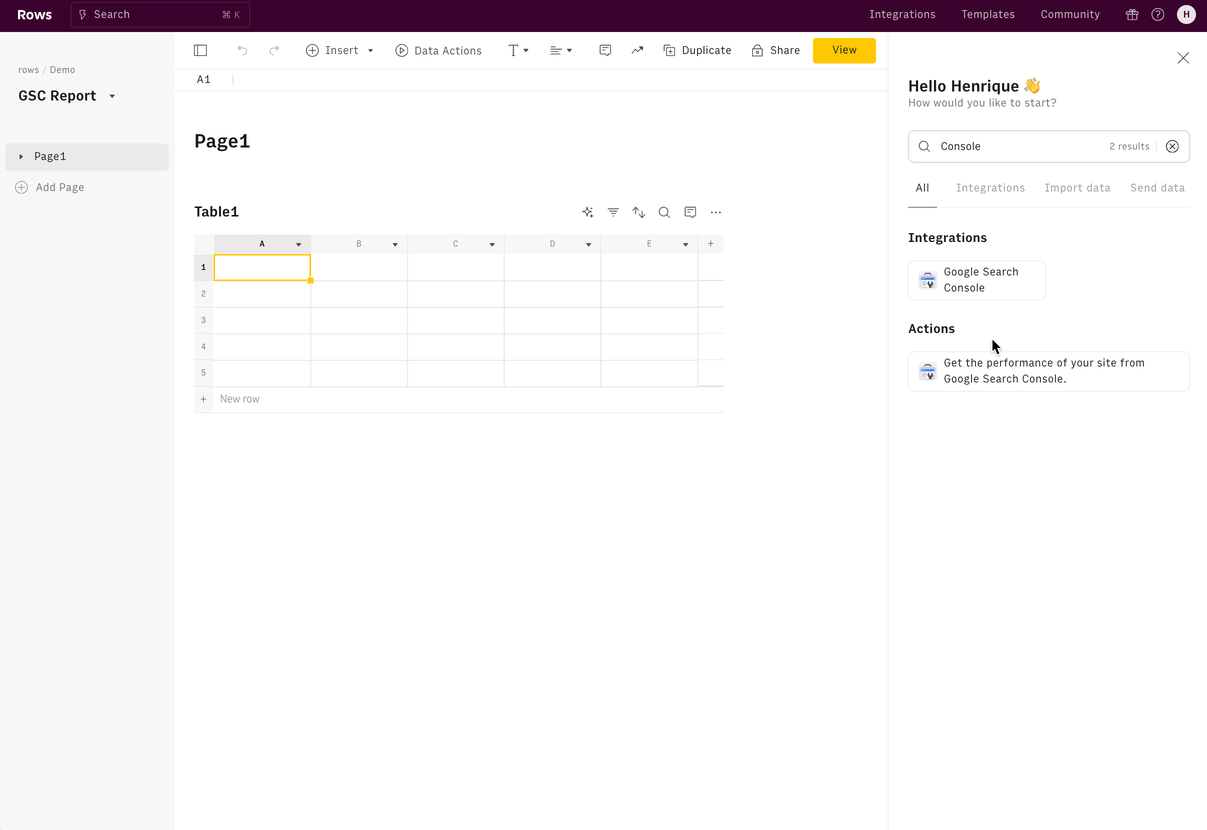 How to create a reporting using the Recommended Actiosn
How to create a reporting using the Recommended ActiosnCustom report: You can also build your own custom data requests. First, select “Create your custom data request” at the bottom of the Google Search Console panel. Then, configure the report with the following parameters:
Domain or url: The domain/url property in Google Search Console.
Target type: The type of GSC propery - url or domain.
Date range: The date range of the report. By default it assumes the last 30 days.
Dimensions: The dimensions define how you want to breakdown the report (split by). Examples include Page, Query, Date, Country or Device. default channel group or Browser. The reports will always include the following metrics: Impressions, Clicks, CTR and Avg. Position.
Filter: You can specify filters for the report, by picking a filter dimension( e.g. Page), a type (e.g. contains) and a value (.e.g ‘/templates’).
Once you’ve configured the data request, click Get data to import it. Once the data is imported, click Data Table to add it to the spreadsheet.
 Google Search Console Custom Report
Google Search Console Custom ReportYou can add multiple reports to the same spreadsheet, and organize it into different Pages, use Pivot Tables and the AI Analyst✨ to transform the data and add different types of charts to complete your Report.
 GSC Dashboard in Rows
GSC Dashboard in RowsPart 2 : Embed the Report in Notion
Now that your GSC SEO report is done, it’s time to embed it into Notion. You can embed any element from a spreadsheet - a Table, Chart, or Form - and have a live connection between your Notion doc and Rows spreadsheet.
To embed each element from your spreadsheet in Notion, follow these steps:
Choose Embed in settings menu located in the right-hand corner of the element you want to embed
Click the Share privately toggle.
Click Copy url
Paste the link on a Notion doc and click to Create embed
 Use Embed to add each element to Notion
Use Embed to add each element to NotionOnce all the elements are embedded, you can drag each element to your desired location and customize the look and feel of your dashboard.
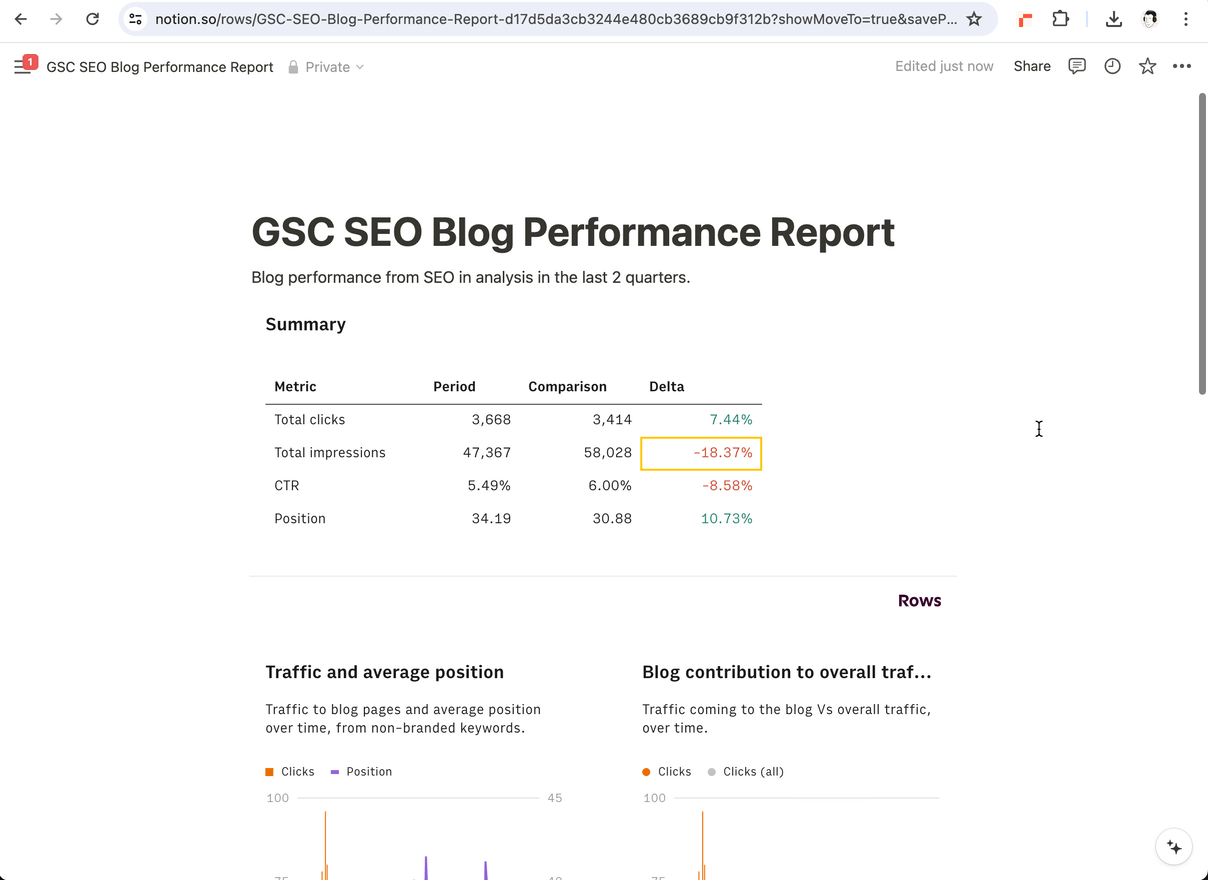 The GSC dashboard in Notion
The GSC dashboard in NotionExtra : Get started with these 5 Google Search Console templates
At Rows we created a several Google Search Console templates to help you get started. You can access them in the Templates library and install them in your Rows account for free.
The following is a short summary of each:
Google Search Console Performance Report
Deep dive into your website Google Search Console performance metrics. Find top-performing and least effective pages, average position over time, device, country and search appearance breakdown of your search traffic.
→ Install the template
Google Search Console Keyword Research Report
Focus on non-branded keywords that generate traffic to your website in three steps: identify high-value queries to keep in your SEO strategy, find high-potential queries to work on and spot SEO easy wins.
→ Install the template
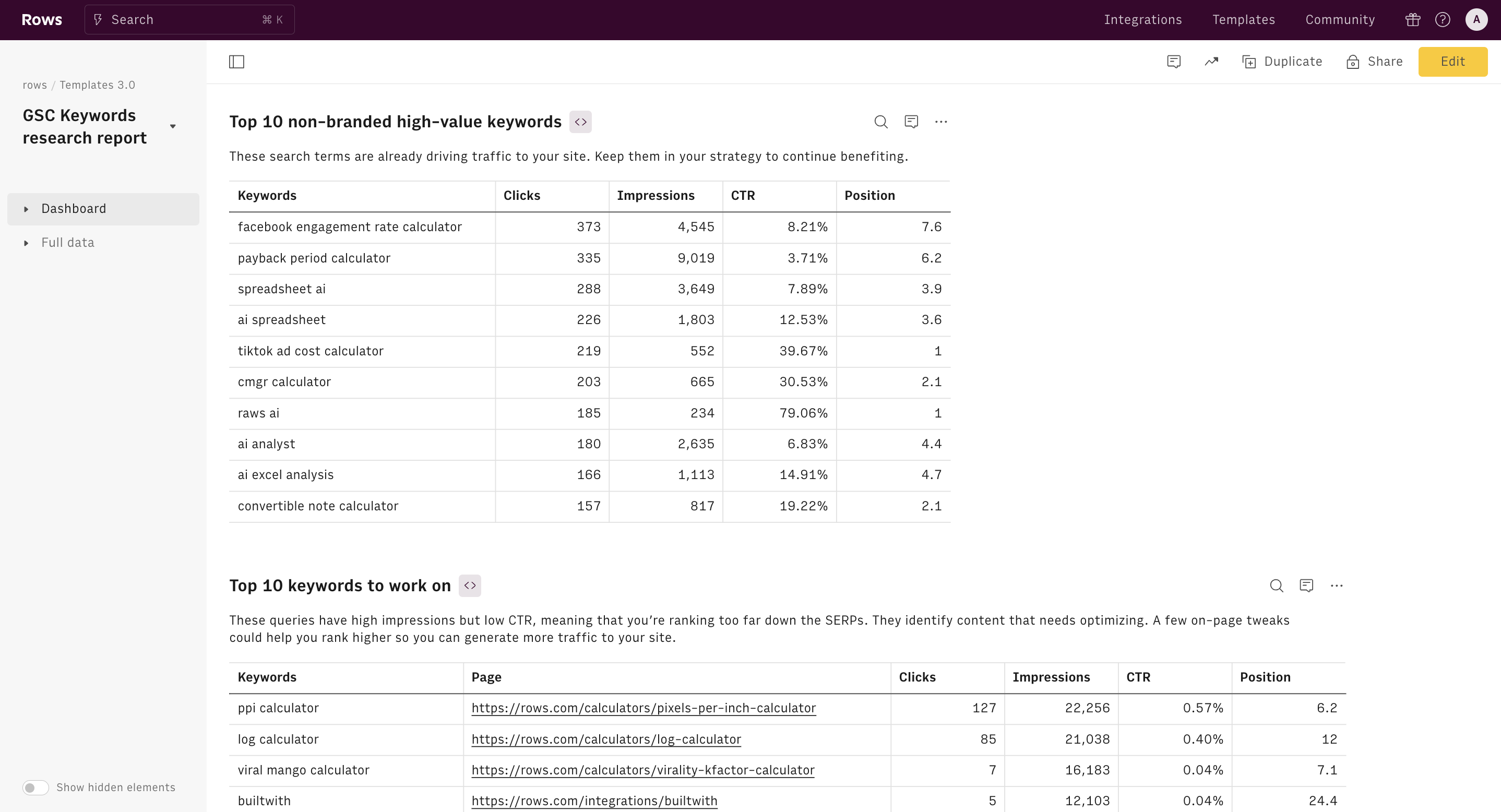 GSC Keyword Research Template
GSC Keyword Research TemplateGoogle Search Console Page Metrics Report
Compare the main search metrics for your website's pages, such as impressions, CTR and position, in different different time periods.
→ Install the template
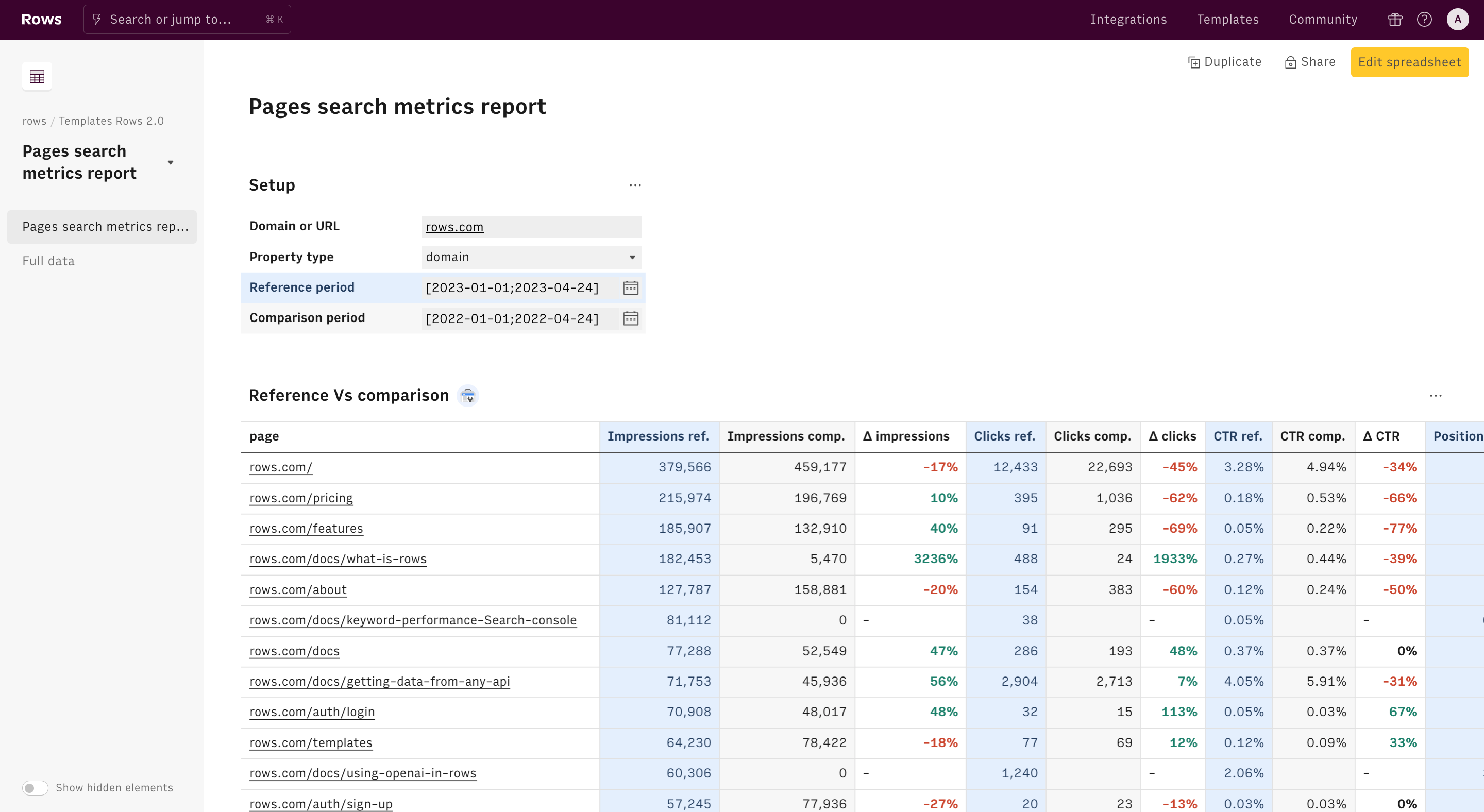
Google Search Console Keyword Cannibalization Checker
Check if your site suffers from keyword cannibalization issues, with pages that serve the same purposes and rank for identical target keyword(s) with same search intent.
→ Install the template
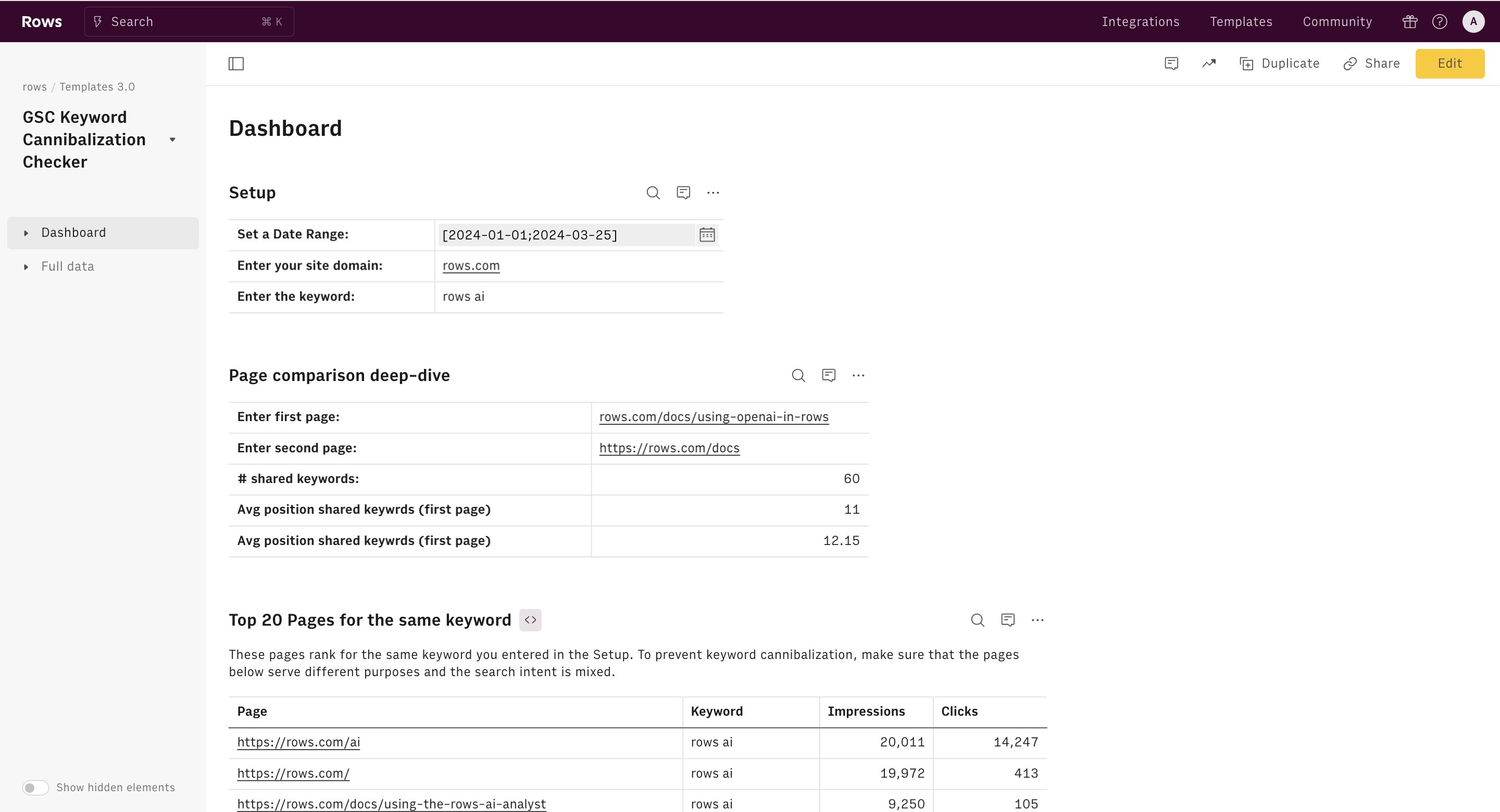
Google Search Console Blog Traffic Report
Investigate your blog traffic by looking into top performing pages and keywords, average position over time and tracking other blog metrics relevant to your SEO strategy.
→ Install the template
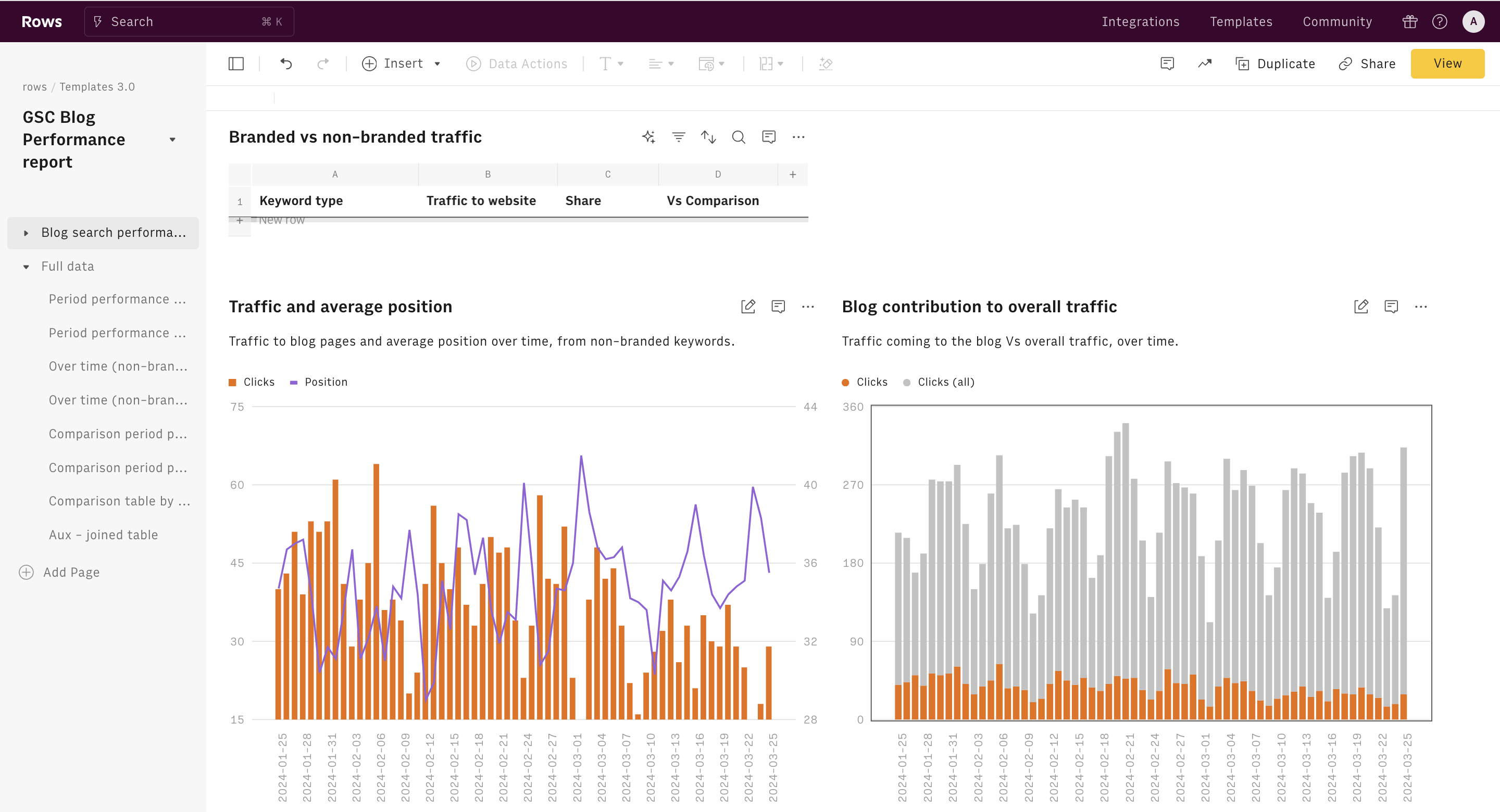
Integrate Notion databases with Rows
If you’re looking for a deeper integration between your Notion databases and a spreadsheet, Rows offers a native integration with Notion.
You can import your Notion databases directly to Rows and use the spreadsheet interface to add beautiful, flexible charts and reports to your Notion pages.
All you’ll need is:
An active Notion account with one or more databases.
A Rows.com account.
Appropriate permissions to integrate third-party apps within Notion
See how to harness the power of Notion in to Rows in our help guide.
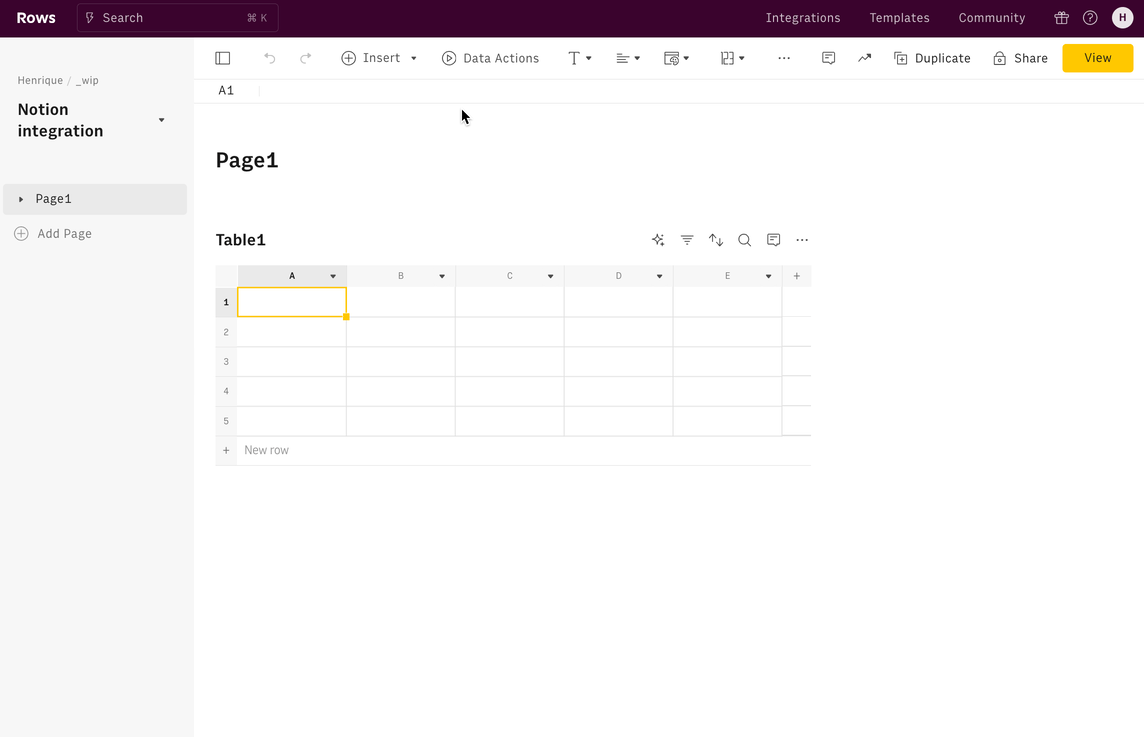 Sync your Notion databases with Rows in a few clicks
Sync your Notion databases with Rows in a few clicksAutomate SEO Reporting with Rows
Combine the flexibility of Notion with the features of Rows to easily incorporate SEO reports into your workflow.
Customize your dashboard by embedding spreadsheet elements into Notion. Get started with Google Search Console templates from Rows library to simplify your reporting, and discover other of our favorite GSC reports.

